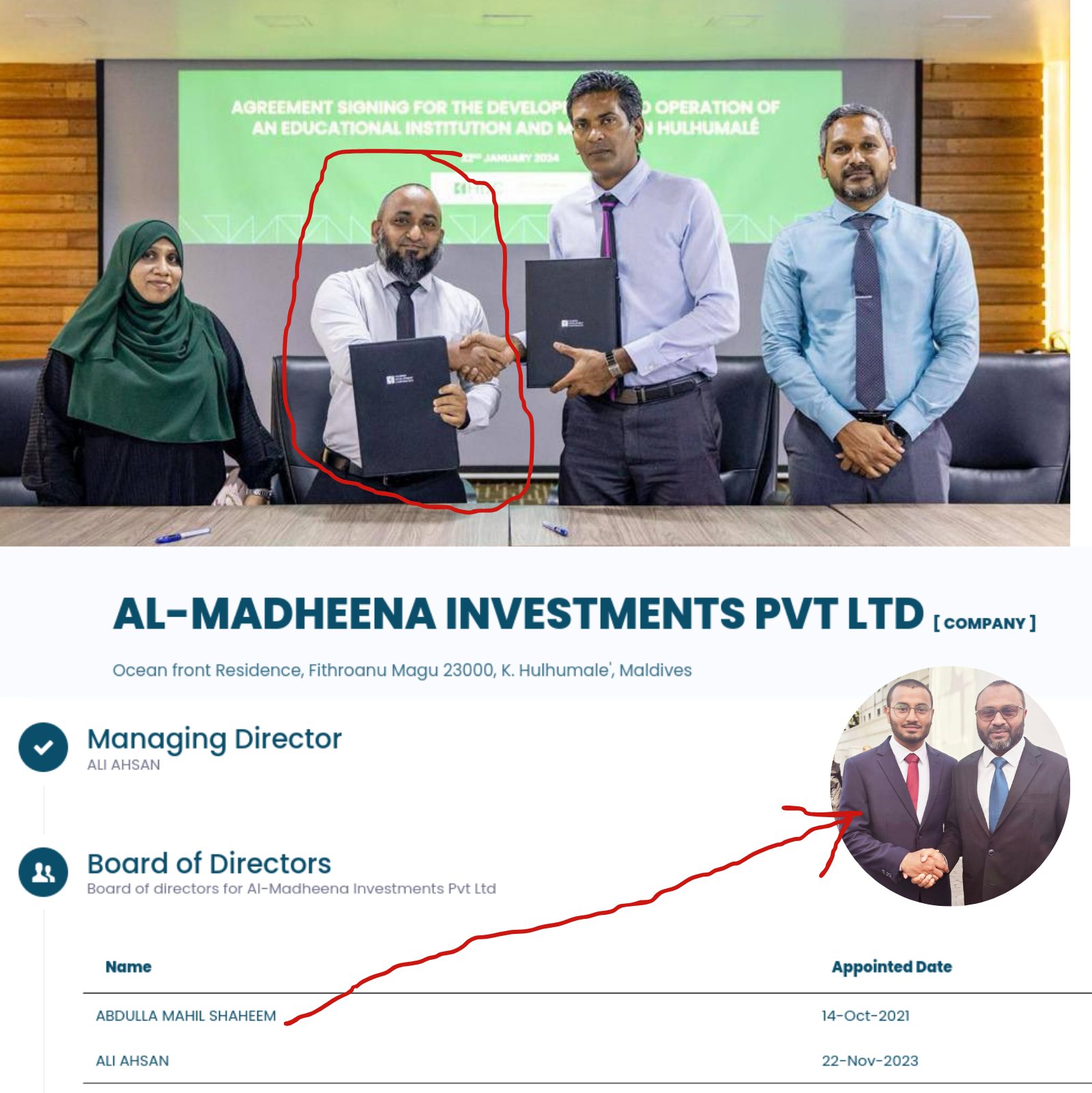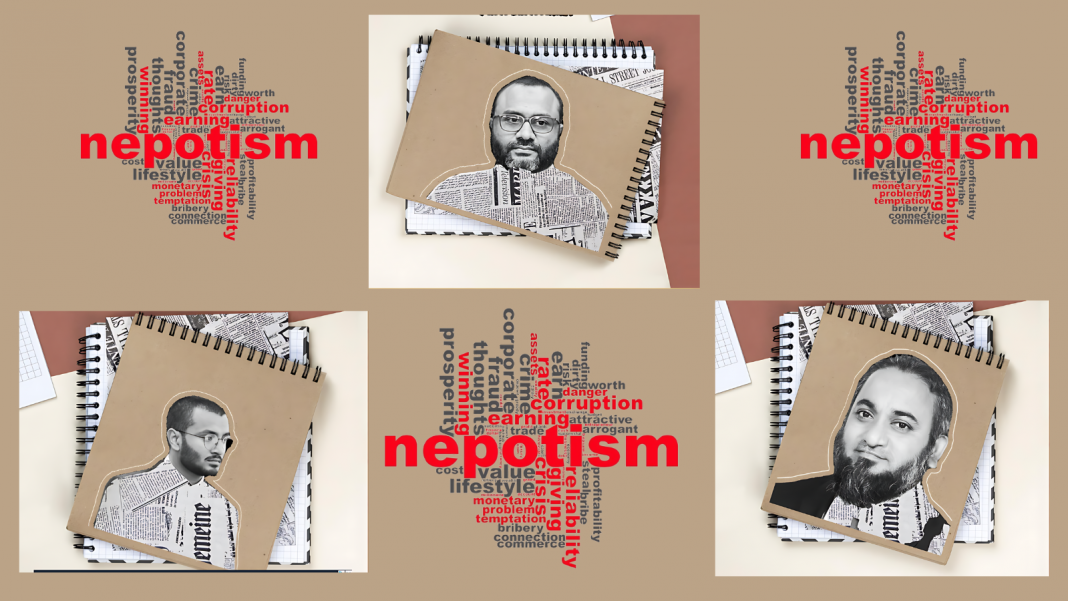The recent revelations surrounding the dealings of Mohamed Shaheem Ali Saeed, the current Minister of Islamic Affairs in the Maldives, paint a concerning picture of corruption and conflict of interest within the government. The details emerging about land allocations, business agreements, and political appointments point towards a deeply ingrained system of cronyism and self-enrichment.
The Land Deal
In a significant development, the Housing Development Corporation (HDC) has allocated land to “Al Madheena Investments,” a company linked to Shaheem. Officially registered under the names of his son, Mahil Shaheem, and his business partner, Ali Ahusan, this agreement raises several red flags. The framework agreement, initially signed last year, underwent significant amendments in January 2024 to favor Shaheem. The final agreement was signed on January 22, 2024.

Shaheem, being a cabinet minister, could not officially hold shares in the company. To circumvent this restriction, he transferred his shares to Ali Ahusan on November 22, 2023. Ahusan, who is also Deputy Minister at the Islamic Ministry, thereby solidified his position within both the business and the government.
The School Development
Under the terms of the agreement, Shaheem is allowed to develop a school in Hulhumale on the land currently occupied for temporary mosque. The HDC offered this mosque building to Shaheem, significantly reducing his construction costs. According to the agreement, Shaheem plans to convert the mosque into both a school and a mosque, promising to provide free education to low-income families and students with special needs. However, this commitment seems more like a strategic move to gain favorable terms rather than a genuine act of corporate social responsibility . The number of beneficiaries under this promise is expected to be minimal, allowing Shaheem to charge full fees for the majority of students, thereby securing substantial profits.
- Shaheem’s school project is planned to be developed in phases:
- Phase 1: Pre-school
- Phase 2: Primary and Secondary
- Phase 3: Higher Secondary
- This phased development, coupled with the low rent and minimal construction costs, positions Shaheem to make significant profits from what is marketed as a specialized Islamic education institution.
Political Appointments and Family Benefits
The web of conflict of interest extends beyond the school project. Shaheem’s political influence has allowed him to secure lucrative positions for his family and close associates within the government. His son, Mahil, holds an embassy job with a substantial salary of MVR 104,000 plus school tuition fees for his child. Shaheem’s sibling, cousins, and business partners hold various deputy minister positions, all drawing significant salaries funded by taxpayers. For instance:
- Shaheem earns MVR 65,000 as a minister.
- His sibling Shifaz earns MVR 30,000 as a Deputy Minister at Tourism.
- His cousin Hassan Ali earns MVR 30,000 as a Deputy Minister at Homeland.
- His cousin Ahmed Shukoor also earns MVR 30,000 as a Deputy Minister.
- His wife Afiya earns approximately MVR 12,000 a month as a board member of Male’ hospital group.
- His long-time business partner, Ali Ahusan, earns MVR 30,000 as Deputy Minister at the Islamic Ministry.
The Role of Qibla Hajj & Umrah Group
Shaheem’s close associates from Qibla Hajj & Umrah Group have been appointed to key government positions. Ali Ahusan, formerly a director at Qibla, is now a Deputy Minister at the Islamic Ministry. Others from Qibla have also secured influential roles, including positions at the Maldives Hajj Corporation Limited and the Ministry of Foreign Affairs. This pattern of appointments raises serious concerns about the integrity and fairness of the government’s hiring practices.
Historical Context and Ongoing Concerns
This is not the first time Shaheem has been embroiled in controversy. In 2013, the Anti-Corruption Commission (ACC) filed a case against him for his involvement in a company, ISI Investment Private Limited, which he co-owned with the then Finance Minister Abdulla Jihad and an Iraqi national. The constitution clearly prohibits cabinet members from engaging in business activities or holding financial interests in transactions involving the state, yet Shaheem’s business dealings continued unabated.
Recent Allegations and Public Outcry
Shaheem’s involvement in a business deal with Dubai-based businessman Firoz Ghulam Khan. Khan promised to donate significant sums to the Zakat fund, yet shortly after, a company was formed with substantial shares in the name of Shaheem’s wife. Specifically, the deal struck in December 2023 involved the formation of “Pure Gold Jewelry Maldives Private Limited,” with Shaheem’s wife holding 1,500 shares, while Firoz Ghulam Khan held 103,500 shares and Kareem Firoz 45,000 shares.
Adding to these concerns are accusations of sexual misconduct against Shaheem. A video by Raajje TV, These actions further demonstrate the blurred lines between Shaheem’s public office and private interests.
The ongoing revelations about Sheikh Mohamed Shaheem Ali Saeed’s business dealings, political appointments, and use of public resources for personal gain underscore a pervasive issue of corruption and conflict of interest within the government. These actions not only undermine public trust but also divert valuable resources away from ordinary citizens, who ultimately bear the brunt of such misconduct.


















